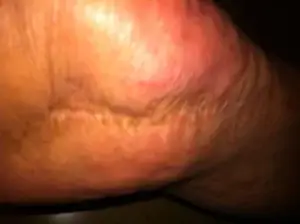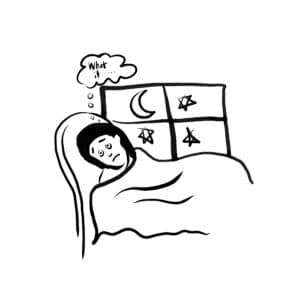
How Going Gluten-Free Transformed our Home
Hi, I’m Melissa, Beth asked me to explain how going gluten-free made a difference in our household. I have a

Hi, my name is Steve
When I discovered Dyslexia Octopus on Instagram, I reached out to Beth to share my story. I’m now in my sixties, and when I was in school, dyslexia wasn’t understood. I first realized I was different from other children the day I was held back a grade.
It was the last day before summer break. The teacher handed out envelopes, each one revealing a student’s assigned fourth-grade teacher for the upcoming school year. Excited to see who mine would be, I eagerly opened the envelope—only to read the crushing words: You need to repeat the third grade.
Overcome with shame and disappointment, I ran to the bathroom, tears streaming down my face. My stomach churned as I dreaded going home, fearing my parents’ reaction. But they already knew—they had chosen not to tell me beforehand.
To make matters worse, my younger brother and I were now in the same grade. Even today, I question the wisdom of placing an older sibling in the same grade as a younger one. It was humiliating, and the only thing that could have made it worse would have been being assigned to the same classroom.
As I progressed through school, I noticed a pattern among the other students who had also repeated a grade. Many struggled with reading, writing, and spelling, just as I did. In high school, we were placed in lower-level or special education classes. Some developed behavioral issues, spoke out of turn, and got into trouble both in and out of school. As adults, many ended up in menial jobs, some were arrested, and several turned to alcohol or drugs.
If dyslexia had been understood, I believe their lives might have turned out very differently. Here is a post about how dyslexia affects a child’s entire life.
Dyslexia didn’t just affect my reading and writing—it impacted many areas of my life. Math, Spanish, and even reading a map felt impossible. Tying my shoes was an agonizing struggle. To this day, I can only tie my laces one way.
It wasn’t until I watched a Dyslexia Octopus video that I truly understood why I struggled with so many of these tasks. I had always assumed dyslexia was just about reading and writing difficulties.

My saving grace was my athletic ability. I was strong for my age, which meant no one dared call me stupid or dumb to my face. I excelled in wrestling until an opponent severely injured my right thumb, leaving it permanently fused. From then on, whenever I was asked to write, I blamed my thumb—a convenient excuse to hide my poor penmanship and spelling.
At fourteen, I thrived in football, basketball, and track and field. As a running back, I was named MVP for my school and the county. I also won every track and field event I entered. My athletic reputation soared, and I had high hopes for a sports career.
Then, during a football game, an opponent who had threatened to injure me followed through. The hit tore my cruciate and medial ligaments, requiring six hours of reconstructive surgery. My confidence was shattered. Though I turned to wrestling, my opponents targeted my weak knee, and I eventually had to give up sports altogether.

In junior high school, I became a Christian. Prayer and reading the Bible provided comfort. I also found guidance in motivational books such as The Power of Positive Thinking, Think and Grow Rich, The Road Less Traveled, and The 7 Habits of Highly Successful People.
I graduated from college, but it wasn’t until my senior year that I heard the term dyslexia. As a PE major, I had to take a learning disabilities course. During the last week of class, the professor described a common but often overlooked disability—dyslexia.
I didn’t need a test to confirm it. I instantly knew I was severely dyslexic. By then, I was 25 years old.
My first job was as a PE teacher and coach at a prestigious Catholic high school in New Jersey. The role suited me because it required little writing—most of my communication was verbal.
However, at an educational conference, I was the only PE teacher in a group discussion. I refused when asked to write the group’s notes on the board. I knew attempting to write publicly could expose my dyslexia and jeopardize my job.
Later in my career, I became self-employed to control my workload. Before modern technology, I relied on secretaries to type what I dictated. Today, I’m grateful for tools like spell check and voice-to-text, which can help dyslexics show their true abilities.
For years, I hid my dyslexia from my partners. It wasn’t until my late forties that I met a wonderful woman who accepted me as I was. For the first time, I could be honest about my struggles, and she loved me despite them.
The stigma of dyslexia has followed me throughout my life. The shame I felt in school cast a long shadow. Ensuring children receive early support is crucial for their self-esteem and future success.
I taught my son to read and spell in 30 minutes a day. Here are my affiliate links to the resources I used: All About Spelling and All About Reading.

Hi, I’m Beth. Seven years ago, when I discovered my son had dyslexia, I had a ‘light-bulb’ moment and understood this explained many of my own difficulties. Ever since, I’ve been on a mission to discover the best ways to wrestle what I like to call the dyslexia octopus.

Hi, I’m Melissa, Beth asked me to explain how going gluten-free made a difference in our household. I have a

I need nighttime anxiety relief. It’s 4 AM, and I’m reviewing what happened to Harry at school yesterday and wondering